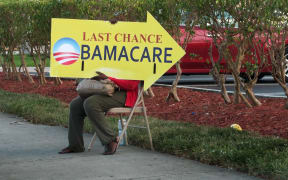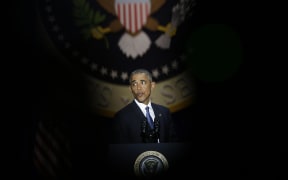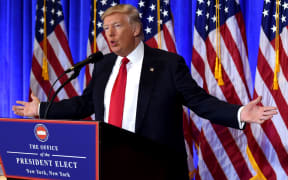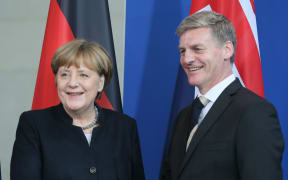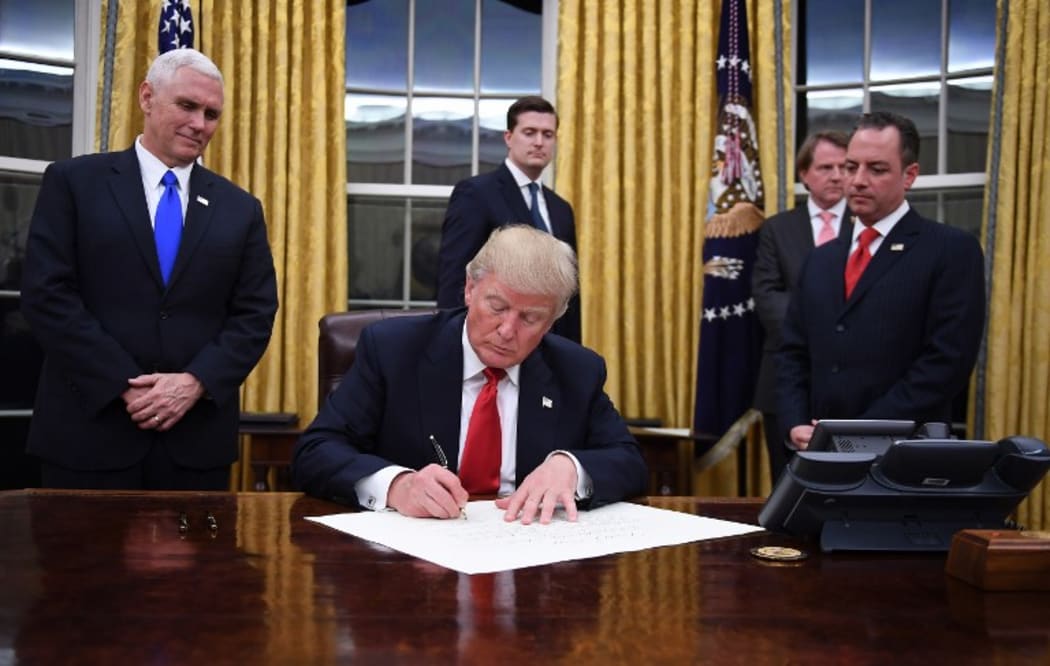
US President Donald Trump signs an executive order as Vice President Mike Pence and Chief of Staff Reince Priebus look on. Photo: AFP
The new US administration of President Donald Trump says its trade strategy to protect American jobs will start with withdrawing from the Trans-Pacific Partnership (TPP).
A White House statement issued soon after Mr Trump's inauguration said the United States would also "crack down on those nations that violate trade agreements and harm American workers in the process."
The statement said Mr Trump was committed to renegotiating another trade deal, the North American Free Trade Agreement (NAFTA), which was signed in 1994 by the United States, Canada and Mexico.
"For too long, Americans have been forced to accept trade deals that put the interests of insiders and the Washington elite over the hard-working men and women of this country," it said.
"As a result, blue-collar towns and cities have watched their factories close and good-paying jobs move overseas, while Americans face a mounting trade deficit and a devastated manufacturing base."
The statement said "tough and fair agreements" on trade could be used to grow the US economy and return millions of jobs to America.
"This strategy starts by withdrawing from the Trans-Pacific Partnership and making certain that any new trade deals are in the interests of American workers."
If NAFTA partners refused to give American workers a fair deal in a renegotiated agreement, "the President will give notice of the United States' intent to withdraw from NAFTA," the statement added.
The TPP, which the United States signed but has not ratified, had been the main economic pillar of the Obama administration's "pivot" to the Asia-Pacific region in the face of a fast-rising China.
Proponents of the pact have expressed concerns that abandoning the project, which took years to negotiate, could further strengthen China's economic hand in the region at the expense of the United States.
Australia's position that a change of heart remains possible in the U.S. and that the trade deal can proceed, is unchanged despite the White House statement, Damon Hunt spokesman for the Australian prime minister, told Reuters on Saturday.
Prime Minister Bill English said this week that New Zealand would continue to promote the TPP, as it was keen to see the deal through.
Trump signs executive orders, swears in members of national security team
Earlier today Mr Trump made his first executive order, one aimed at his predecessor's signature health care law.
Hours after delivering a stinging rebuke of the political status quo in his inaugural address, Mr Trump sat at the president's formal desk in the Oval Office as he signed the order that White House chief of staff Reince Priebus said was aimed at "minimising the economic burden" of the Obamacare law.
The order notes that Mr Trump intends to seek the "prompt repeal" of the law. But in the meantime, it allows the Health and Human Services Department and other federal agencies to delay implementing any piece of the law that might impose a "fiscal burden" on states, health care providers, families or individuals.
Moments later, Vice President Mike Pence administered the oath of office to Defence Secretary James Mattis and Homeland Security Secretary John Kelly, the first members of Mr Trump's Cabinet to clear Senate confirmation.
The swearing-in ceremonies came amid a hectic set of activity late Friday (local time), before Mr Trump was to attend three inaugural balls. As Mr Trump signed the paperwork, the White House announced Mr Priebus had sent a memorandum to agencies and departments outlining guidelines for slowing regulations.
Asked about his first day as president, Mr Trump said, "It was busy but good - a beautiful day."
Although Mr Trump campaigned on a detailed 18-point plan of things to do on Day One, he has since backed off some of his promised speed, downplaying the importance of a rapid-fire approach to complex issues that may involve negotiations with Congress or foreign leaders.
Mr Trump has said that he expects Monday to be the first big workday, his effective Day One.
- Reuters / RNZ
